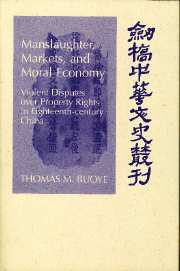 Manslaughter, Markets, and Moral Economy
Manslaughter, Markets, and Moral Economy Published online by Cambridge University Press: 28 October 2009
By the early eighteenth century, establishing property rights in land had replaced maintaining property rights in human beings, bonded servitude, as a serious locus of social conflict. Violence on the order and magnitude of the bond servant uprisings and large-scale peasant uprisings of the Ming-Qing transition would not reappear in China until the close of the eighteenth century. As property rights in land became the focus of contention, social conflict became more personalized, communal, and small scale compared to the unrest of the seventeenth century. Struggles over property rights in land in the eighteenth century were comparatively less dramatic, but they were still significant. Although each violent dispute over property rights recounted in the following text possessed its own distinct set of circumstances and any individual dispute taken in isolation would be open to a variety of interpretations, an examination of disputes in Guangdong over a sixty-year period reveals a vivid picture of economic change and social conflict in rural society. From this picture, it is possible to discern the link between the individual struggles of common people and the broader economic trends of the eighteenth century.
As land increased in value and the economy became more commercialized, the potential for disputes and violence was twofold. On the one hand, population pressure and rising land values intensified and aggravated mundane disputes over land and strained the existing structure of property rights in land. Even the simplest dispute over land took on greater urgency as the relative scarcity of land increased.
To save this book to your Kindle, first ensure no-reply@cambridge.org is added to your Approved Personal Document E-mail List under your Personal Document Settings on the Manage Your Content and Devices page of your Amazon account. Then enter the ‘name’ part of your Kindle email address below. Find out more about saving to your Kindle.
Note you can select to save to either the @free.kindle.com or @kindle.com variations. ‘@free.kindle.com’ emails are free but can only be saved to your device when it is connected to wi-fi. ‘@kindle.com’ emails can be delivered even when you are not connected to wi-fi, but note that service fees apply.
Find out more about the Kindle Personal Document Service.
To save content items to your account, please confirm that you agree to abide by our usage policies. If this is the first time you use this feature, you will be asked to authorise Cambridge Core to connect with your account. Find out more about saving content to Dropbox.
To save content items to your account, please confirm that you agree to abide by our usage policies. If this is the first time you use this feature, you will be asked to authorise Cambridge Core to connect with your account. Find out more about saving content to Google Drive.